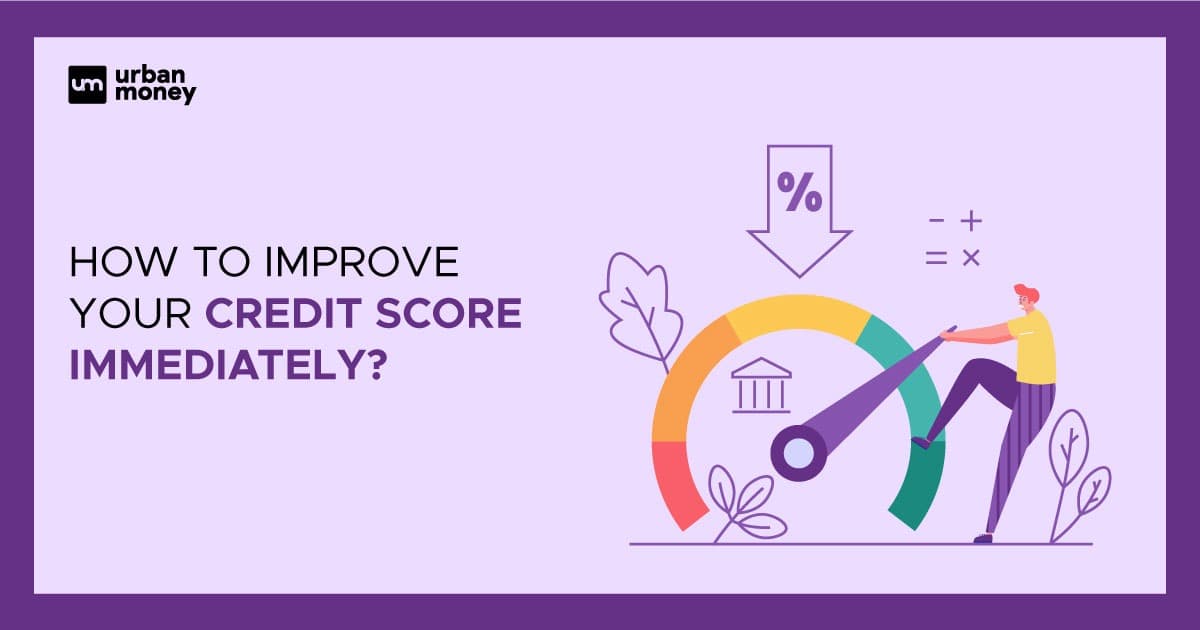- Home
- Credit Score
- How To Increase Cibil Score Fast Csgen
How to Improve Your CIBIL Score : Advanced Techniques & Tips


- Instant Results
- No Hidden Fees
- Secure & Confidential
- No Impact on Your Credit Report
I agree to the Terms and Conditions of TUCIBIL and hereby provide explicit consent to share my Credit Information with Urban Money Private Limited.
Verify your number
Enter 6 Digit OTP
Change mobile number
Table of Content


Thanks to modern platforms, it’s easier today to manage your money, whether it’s your salary, credit card, or hefty home loan. To be financially healthy, you need to learn a bit about your credit score. CIBIL has a lot of ground to cover, but today, we will tell you how to maintain a good balance without being hassled about it.
10 Ways to Increase Your CIBIL Score
Pay On Time
Paying on time is one of the simplest ways to keep your credit score in good shape. It shows lenders that you’re reliable and manage your debts responsibly. A very handy way to do so is to set reminders or opt for automatic payments to avoid missing payments. Regularly checking your credit report to ensure all your payments are accurately recorded is also a good idea. Staying on top of your payment schedule can greatly affect your financial health.
Manage Your Credit Utilization
A strong credit score is key to how much credit you use compared to your limits. Aim to use less than 30% of your available credit across all accounts. This shows lenders you’re not overly reliant on credit and can manage your finances wisely. If you’re nearing your limit, consider spreading your spending across multiple cards or asking for a credit limit increase, but only if you can afford the extra credit. Regularly monitoring and adjusting your spending habits can boost your credit score quickly.
Switch to Automatic Payments
Setting up automatic payments for your bills and credit card ensures you never miss a due date. Missed or late payments can negatively impact your credit score. Most banks and credit institutions offer this feature, which can also be found on platforms like Paytm, Google Pay, and more. This makes it easy and gives you a better view of your monthly finances.
Just ensure you have sufficient funds in your account before the due date.
Keeping Your Finances in Check
It is all about making smart financial moves. It starts with setting up a simple budget to track your ways. This isn’t just about cutting back (though that can help); it’s about making sure you’re spending wisely on what matters most to you. Paying yourself first by savings. Even a small amount can make a big difference over time.
Avoid making impulse purchases over credit cards; think twice before swiping. Try the 21-day rule; if you want to purchase something, hold that thought for 21 days. You would buy it even after a month if you really wanted it. If not, then you just dodged a bullet of impulse purchase.
Keep an Eye on Your Credit Report
Don’t go by the words; it is more than a score. Credit reports offer an understanding of your financial health. Regular reviews can help you catch errors and fraudulent activities. If you spot them early, you can safeguard your credit score and money. Think of it as a financial health check-up that ensures everything is on track and allows you to make informed financial decisions. Regular checkups also help you be educated about scores, and be wise about the money!
Learn the Art of Credit Mix
Managing your credit wisely is a disciplined art. It’s important to have a mix of credit, like a car loan, a credit card, and maybe a mortgage. This shows lenders that you can handle it responsibly. This approach can lead to a better credit score. However, it comes with a high risk. You always need a stable income to balance; if you cannot pay any, it causes more harm than good.
Limit Your Credit Enquiries
When you apply for multiple credit cards simultaneously, each entity checks your credit limit. Every time someone does it, it creates a hard record of credit check. This whole process is known as a hard inquiry. With each check, you’re being judged financially, which creates a dent in your score. It might make people wonder why you’re asking so many at once. That’s why it’s wise to be thoughtful about when you’re applying for new credit. Limiting your applications to only those you’re confident about helps protect your credit score.
Old is Gold, Keep Everything Active
Holding onto your old credit accounts, keep your financial journey alive. These accounts contribute significantly to your credit score by showcasing your depth of credit history. Closing these accounts abruptly will result in a loss of valuable trust points. It’s better to maintain these old lines of credit, even if you’re not using them or have a bad history.
So, think twice before cutting ties with your old credit accounts; they’re silent yet powerful allies in your credit score journey.
Don’t Forget Your Joint Accounts/Co-Applicant Loans
Keep an eye on any loans or financial assets you have attached to someone. If you share an account with someone, like a bank account, mortgage or credit card, whatever happens with that account affects both of you. So, if the person you share the account with misses a payment or spends too much, it’s not just their problem—it could hurt your credit score, too.
To avoid trouble, check on these accounts often. If you see something off, like a failed payment or a higher-than-expected balance, talk it out and devise a plan. It’s all about teamwork. And hey, if things change—maybe you and the person you share the account with aren’t as close anymore—it might be a good idea to rethink whether you still want that joint account. Keeping on top of these shared accounts can save you from a headache (and a dip in your credit score).
Last But Not The Least, Build a Financial Cushion
It’s your safety net for those “just in case” moments. When life throws you a curveball, having some money stashed away means you won’t have to slap it all on your credit card and risk maxing it out. If you’re not stressing about finding cash for surprises, you’re less likely to miss a payment or rely too heavily on credit. Starting small is fine; what matters is that you start. Over time, save enough to cover a few months of expenses. This cushion keeps your credit score healthy and gives you peace of mind.
Range of Credit Score
Now that you know how to make a healthy score, let’s see what healthy score looks like!
| Score Range | Credit Quality | Impact |
| 750 – 900 | Excellent | Eligible for best interest rates and loan terms |
| 700 – 749 | Good | Favorable loan terms |
| 650 – 699 | Fair | May face higher interest rates |
| 550 – 649 | Poor | Higher interest rates, limited credit options |
| Below 550 | Very Poor | May not qualify for most credit |
Conclusion
In wrapping up our guide to boosting your CIBIL score, we’ve made it clear that you don’t have to be a bookworm to have a good score.
Some patience, smart financial habits, and the right guidance will do the trick. Following Urban Money lets you learn more about such smart stuff with just a click. Urban Money supports you in this journey, offering insights and tools tailored to your financial growth. Let’s move forward together, turning your credit goals into reality with practical steps and continuous learning.
| Related Guide |
| How is your CIBIL score calculated? |
| Written Off in CIBIL Reports |
| How to Check CIBIL Score with PAN Card |
| CIBIL Commercial Report |

FAQs
Can I improve my CIBIL score in 30 days?
Can I pay to fix my credit score?
How many days will it take to increase the CIBIL score?
How can I hide my bad credit history?
Is credit repair high risk?
Where can I check my credit score and credit report?
Credit Score Guide
Get in-depth knowledge about all things related to Credit Score and your finances
Is 750 a Good Credit Score? Benefits and How to Achieve It
Easy Ways to Achieve a Credit Score of 750 A credit score of 750 is considered very good. It helps you get loans easily with low interest rates. You must manage your credit well and follow good financial habits to achiev
CIBIL Score Check For Union Bank of India
How to Check Union Bank of India CIBIL Score Urban Money offers a simple method to check your Union Bank of India cibil score at no cost! Here’s how to check your credit score on Urban Money’s website: Visit the Urban M
How a Single Missed Payment Can Impact Your CIBIL Score
Short-Term Consequences of Defaulted Repayments Defaulting on a repayment can hurt your financial reputation and lead to several immediate effects. Here are a few short-term consequences that can happen if you miss a sin
How to Resolve CRIF High Mark Credit Report Errors
Common Errors Found in CRIF High Mark Credit Reports Here are the common errors found in CRIF High Mark credit reports: Closed Accounts Showing as Open: Accounts you have paid off may still appear open. This can affect
Why Checking Your CIBIL Score is Crucial Before Applying for a Loan
Understanding CIBIL Score A CIBIL score is a three-digit number that shows how responsible you are with money and credit. It ranges from 300 to 900, with a higher score meaning you handle credit well. Credit Information
How Gold Loans Affect Your CIBIL Score and Tips to Protect It
Does Taking a Gold Loan Affect Your CIBIL Score? The short answer is yes, it does. However, whether the impact is positive or negative depends entirely on how you manage your gold loan. When you take out a gold loan, you
Managing CIBIL Score and Financial Emergencies
Understanding CIBIL Score Basics A CIBIL score is a three-digit number between 300 and 900 that shows your creditworthiness. It is based on your credit history, which includes how you have handled loans and credit cards.
Role of CIBIL Score in Car Loan Approval and Terms
How CIBIL Scores Influence Car Loan Approval? The CIBIL score is a three-digit number that ranges between 300 and 900. A higher score indicates better creditworthiness and vice versa. Lenders typically prefer applicants
Kotak CIBIL Score: How to Check & Loan Requirements
How to Check Your Kotak CIBIL Score? Checking your CIBIL score regularly is crucial for maintaining a healthy credit profile. Here is a step-by-step details to checking your Kotak CIBIL score: Visit the Official CIBIL W
CIBIL Score for Car Loans: Top Picks for 2025
List of Best Car Loan in India 2025 Here are some of the best available car loan options in India with minimal interest rates and low processing fees: State Bank of India Car Loan SBI offers a fantastic deal to finance
Does Checking Your CIBIL Score Impact Your Credit Score?
Does Checking Your CIBIL Score Affect It? True or False? The short answer is false. Checking your CIBIL score is considered a soft inquiry and does not impact your credit score. People often get confused because they fai
How to Avoid Credit Repair Scams and Protect Your Credit Score
Understanding Credit Repair Scams Credit repair scams are traps set by individuals into luring you by offering you a magical solution that practically holds no meaning. They use sneaky tricks to make you believe they can
Difference Between Equifax & CIBIL Score
Equifax Vs CIBIL Understanding credit scores is paramount for securing loans and credit cards in India. Equifax and CIBIL (TransUnion CIBIL) are prominent players in this arena. While both provide credit information to l
How Student Loans Influence Your Credit Score
The Impact of Student Loans on Your Credit Score The impact of education loans on CIBIL scores can be positive and negative. As mentioned above, the outcome largely depends on managing your credits. For a more detailed i
How Bankruptcy Impacts Your Credit Score
Impact of Bankruptcy on Your Credit Score Here are the key aspects of how bankruptcy impacts on your credit score and beyond: 1. Significant Drop in Credit Score Your credit score takes a massive hit when you file for ba